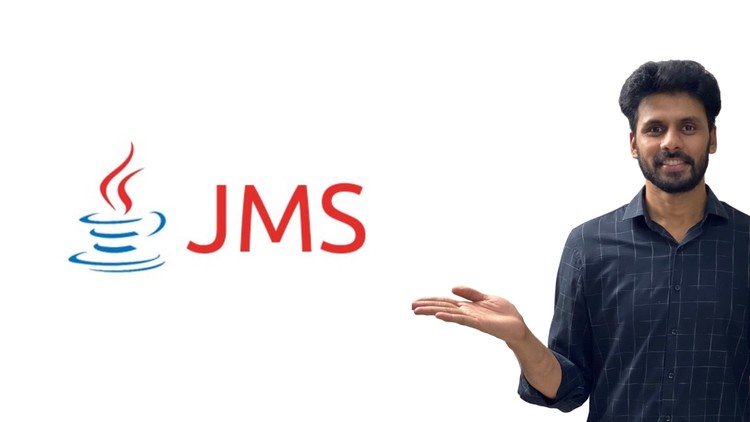Course overview
- Provider
- Udemy
- Course type
- Paid course
- Level
- All Levels
- Duration
- 6 hours
- Lessons
- 101 lessons
- Certificate
- Available on completion
- Course author
- Bharath Thippireddy
-
- Learn what messaging is and its advantages
- Understand the two different types of messaging
- Look at the anatomy of a JMS message
- Use JMS 1.X and 2.x APIs and learn the differences
- Use the JMS API to Implement point to point messaging
- Implement request-reply scenario
- Use the JMS API to Implement Publish-Subscribe messaging
- Work with durable and sharable subscribers
- Filter the message using properties and message headers
- See load balancing in action
- Learn asynchronous processing of messaging using Listeners
- Acknowledge message through different message acknowledgement modes
- Use JMS transactions to ensure message delivery
- Learn how to use JMS API in the Java EE context
- Deploy your JMS applications on a application server
- Use Spring Support for JMS
- All in simple steps
Description
Sample of the reviews:
What a wonderful course by Bharat. He has explained every topic of JMS starting for basics and taking the journey to fully mastering the concepts using various quizzes and coding assignments. Totally recommend this course. Thanks a lot, for this course. You are a true mentor. - Amit Kumar
Yes. 110%. Bharath always delivers high-quality, succinct courses, with hands-on programming. - Maurice McFarlane
Very good overview of the Topic with enough detail that a developer can grasp the essentials quickly and make use of them immediately. Very well thought-out and presented. - Richard Kowalsky
---
Do you have the knowledge of Java want to master Java Messaging Service then this course is for you.If you are an experienced Java EE developer who wants to fill in any gaps in your knowledge of Messaging and know how messaging can be used to develop loosely coupled ,scalable and reliable applications then this course is for you too.You will explore both point-to-point and publish/subscribe models of messaging. You will also explore how synchronous and asynchronous messaging is accomplished. While the JMS API provides fundamental messaging support, you also explore Enterprise JavaBean's Message Driven Bean (MDB).
JMS makes it super easy to create interoperable applications that communicate with each other using messaging. You will start this course by learning what Messaging is ,what JMS is and how to use the JMS API .You will be working hands on one feature at a time .You will
Learn what messaging is and its advantages
Understand the two different types of messaging
Look at the anatomy of a JMS message
Use JMS 1.X and 2.x APIs and learn the differences
Use the JMS API to Implement point to point messaging
Implement request-reply scenario
Use the JMS API to Implement Publish-Subscribe messaging
Work with durable and sharable subscribers
Filter the message using properties and message headers
See load balancing in action
Learn asynchronous processing of messaging using Listeners
Acknowledge message through different message acknowledgement modes
Use JMS transactions to ensure message delivery
Learn how to use JMS API in the Java EE context
Deploy your JMS applications on a application server
All in simple steps
Similar courses

-
56 hours
-
356 lessonsCertificate

-
81 hours
-
401 lessonsCertificate


